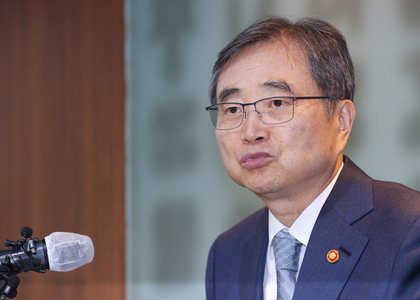South Korea's FM calls nuclear-free Korean Peninsula 'imperative', never to be abandoned
By IANS | Updated: November 18, 2025 18:45 IST2025-11-18T18:44:17+5:302025-11-18T18:45:23+5:30
Seoul, Nov 18 South Korea's Foreign Minister Cho Hyun said on Tuesday a Korean Peninsula without nuclear weapons ...

South Korea's FM calls nuclear-free Korean Peninsula 'imperative', never to be abandoned
Seoul, Nov 18 South Korea's Foreign Minister Cho Hyun said on Tuesday a Korean Peninsula without nuclear weapons is an "imperative" that should not be abandoned, committing to ensure the peninsula does not become a flashpoint of armed conflict.
Cho made the remarks in his keynote speech to the Seoul Diplomacy Forum 2025, hosted by the Korea National Diplomatic Academy. The speech was read out by Youn Jong-kwon, Ambassador for international cyberaffairs, as the minister is currently on an overseas trip.
"Korea's top priority on the security front is to prevent war and ensure that the Korean Peninsula does not become a flashpoint of armed conflict," Cho said, calling a "nuclear-free" Korean Peninsula an "imperative we must never abandon," Yonhap News Agency reported.
The minister referred to the government's goal of the phased denuclearization of the peninsula -- first stopping North Korea's nuclear arsenals, then reducing and ultimately dismantling them.
Seoul will solidify its defense capabilities against North Korean threats, but such measures should also be "accompanied by efforts to prevent inadvertent conflicts, deescalate tensions and restore dialogue with Pyongyang," he said.
Now, South Korea faces "ever more complex strategic calculations," Cho noted, citing increasing geopolitical and geoeconomic competition, and growing nuclear and missile threats from North Korea.
"The quest for peaceful coexistence should not be limited to the Korean Peninsula, but we must seek to prevent the hardening of confrontational blocs in our region as well," he also said, pledging efforts to trilateral cooperation among Korea, the United States and Japan, as well as among Korea, China and Japan, to promote regional stability.
In a subsequent discussion session, Japanese Ambassador to South Korea Koichi Mizushima emphasised the growing importance of South Korea-Japan cooperation against the backdrop of declining multilateralism on the international stage.
"Minilateralism" is now one of the potential choices when "we see the global multilateral system does not work as effectively as before," Mizushima said, pointing to the situation as an opportunity for the two countries to deepen their cooperative relations.
During the session, Chinese Ambassador Dai Bing emphasized that China has no intention to challenge anyone but is seeking only to fulfill the heavy task of improving the livelihoods of its 1.4 billion people.
"But if you think China's development is a challenge, a threat to some country, we have no choice ... (but) to defend our core interests and our dignity," the ambassador warned.
Touching on US-China relations, Dai said Beijing does not want any war on tariffs, trade or technology with Washington, casting a "cautiously positive" outlook for bilateral relations.
Disclaimer: This post has been auto-published from an agency feed without any modifications to the text and has not been reviewed by an editor
Open in app